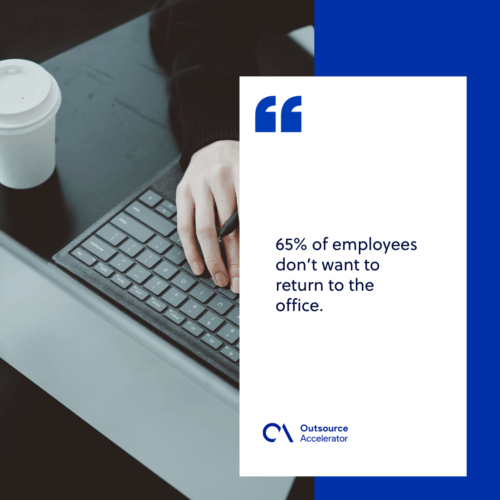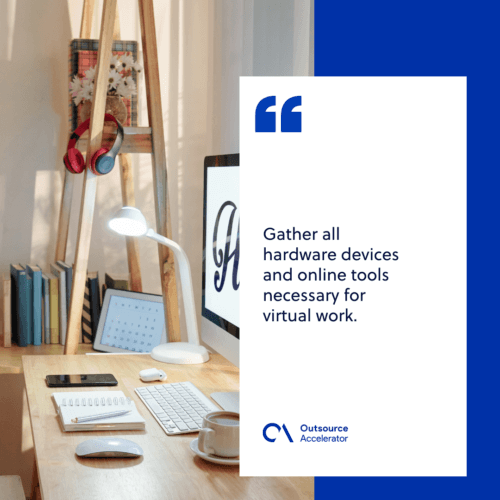Virtual work: Everything you need to know at a glance

Businesses around the world are slowly returning to their offices. Yet, after years of lockdown and remote working, this is bound with the demand for everyone to have an option on how to render work.
Along with hybrid and office-based working, virtual work continues to rise with more companies practicing it. Seeing the advantages that working from home provides, many firms have decided to make it permanent for their teams.
It takes time and adjustments to prepare for virtual work and make it successful. Find out everything companies should know about it in this article.
What is virtual work?
Virtual work refers to work rendered outside the confines of an office. Usually, it implies that employees are working from home using laptops and online tools to get their work done.
Traditional and distributed companies can hire employees that will render virtual work. This is mostly marketed as home-based work opportunities. Much in the same way as remote work [1], virtual work is 100% remote.
Why virtual work is good for companies
Virtual work brings more than savings for firms , especially when partnering with tried and tested virtual staffing solutions provider such as Clark Staff. It brings the convenience that both hybrid and office-based work lacks in terms of the following aspects.
- Flexibility. For employees, virtual work gives them the flexibility to do their tasks without the confines of a nine-to-five job. For companies, this translates to managing their teams everywhere possible.
- Maximized revenues. Companies offering virtual jobs can maximize their revenues by saving on overhead costs. As a result, they can allocate their profit to building a better business.
- Better performance results. As long as the goals and metrics are clear, employees free from micromanaging[2] and unnecessary overtime can achieve better work performance.
- Wider hiring opportunities. Lastly, employers won’t have to be confined to a single location when looking for the best talents. They can look for the most suitable hires online directly or with the help of a recruitment firm.

How everyone can prepare for virtual work
While many companies still prepare for their employees’ return to the office, most have planned to make virtual work a permanent fixture. Given that 65% of employees don’t want to return to the office, organizations had to take several measures to retain their teams.
Meanwhile, preparing for virtual work takes time for both the company and its teams. Here are some of the measures they can take to prepare for permanent virtual work.

Companies
Know which roles can be done remotely
Not all functions are remote-friendly. Companies should decide which functions are applicable for virtual work and which should stay inside an office.
Have all processes and metrics ready
Once roles are identified, employers should prepare all their processes and metrics. They should be able to translate their processes into a single system for tracking and transparency.
Prepare tools to use
Gather all hardware devices and online tools necessary for virtual work. At the least, virtual workers should have one form each for communications, data storage, collaboration, performance tracking, and other tools accessible.
Talk to employees about the changes
When all is set, it’s time for companies to talk to their employees about the shift. Gather all employees and outline the details about the move, what to expect, and their opinions and suggestions about it.

Employees
Practice having work routines at home
Businesses should encourage employees to practice organizing their workday. Indeed, virtual work introduces different kinds of distractions. Forming a routine can help them overcome these distractions and get focused on their tasks.
Start slowly
Help employees transition to virtual work by starting slowly. They can start to work from home one or two days a week, then transition slowly once everyone is comfortable with the setup.
Be mindful of KPIs
Employees can easily get distracted at first on remote work, forgetting their metrics and KPIs to monitor. To prevent this, always remind employees of their metrics and monitor their performance regularly.

Keep in touch
Communication tools are not just there for strictly formal communications and connections. Virtual workers could easily get detached from their employers, causing them to disengage from their work. Prevent this by encouraging steady interactions with their peers online.
Necessary virtual work qualities your team needs
More than ever, firms and their teams should adapt to the changing needs of the workforce. Virtual work will be effective for the company with the help of the following work qualities a team should possess.
Adaptability and flexibility
The transition to virtual work mainly requires flexibility and adaptability from the teams involved. They should know how to adapt to their environment outside of the office and to unexpected situations. This includes issues in IT and logistics.
At the same time, they should be flexible enough to adjust to their tasks and deliver optimal performance.
Focus and discipline
Another aspect that will make virtual work successful is focus and discipline, which are crucial to finishing the tasks at hand.
At the same time, each employee has to be proactive and take the initiative at work even without constant reminders from their leaders.
Good communication and collaboration
Most importantly, teams should establish strong communication and collaboration through virtual work. While collaboration is easier with a teammate nearby, it can be challenging when they only see each other through Skype.
A key to strong team collaboration is established communication between employees. In a virtual setting, it’s normal for teams to communicate through writing instead of speaking.
The future is now: virtual work at its finest
Indeed, virtual work remains to be a fixture worldwide. With this, global firms should continue adapting to the times.
Studies even expect remote work to increase. Career site Ladders projects that 25% of professional jobs in the US “will be remote by end of [2023].” Imagine how virtual work will even play out in the rest of the world at this time.
Meanwhile, despite the increasing demand for working virtually, some companies are still adamant about the move. It could be due to their doubts or capacity to have their employees work from home.
For that, outsourcing to premier staffing solutions providers like Remote Employee can be the smartest decision for them. Clients can start hiring a few teams to delegate their functions virtually, practice monitoring them, and see how their processes improve over time.
Article references:
[1] Remote work: Sull, Donald; Sull, Charles; Bersin, Josh. MIT Sloan Management Review; Cambridge Vol. 61, Iss. 4, (Summer 2020): 1-10
[2] Free from micromanaging: Badran, Omar; Al-Haddad, Shafig. Journal of Management Information and Decision Sciences; Weaverville Vol. 21, Iss. 1, (2018): 1-20.







 Independent
Independent




